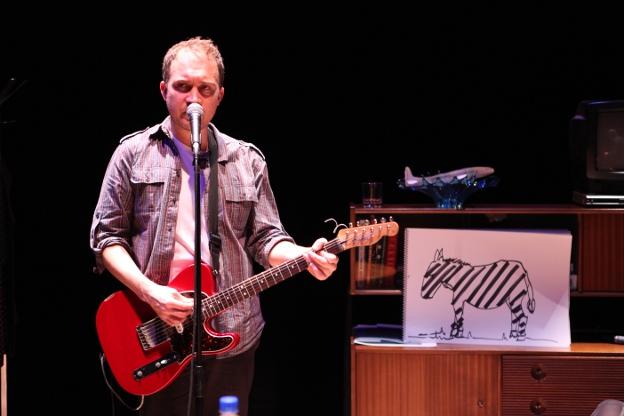Before us is a collection of rescued objects. An apparent undergraduate bed-sit of reclaimed clutter: a pharmacy sign, wallpapered stag-head and lifesaver ring adorn Seventies G-Plan furniture and beaten lockers, while an incongruous unoccupied fish-tank, ill-looking houseplants and eclectic seating break the mise-en-scene into thirds. Three men occupy this environment – a living archive of rescued objects and expressions of thought that will come to be a testing ground for rumour and fact.
Through scripted conversation George, Alex and Chris take us around the world, exploring what they have heard about various lands and the people that occupy them. There is an appropriate air of the pub-philosopher to the proceedings, akin to those righteous conversations we all overhear and are so desperate to interject upon, but which make us guilty too as we judge them based on the small soundbites we hear. What I Heard About The World is an anecdotal archive, presenting truths and dissecting them in what awkwardly appears to be simplistic theatrical devising.
Chris, our righteous guide to the proceedings, bashes away at his electric guitar. His coarse, masculine, Northern tone resonates with a sense of socialist justice as he announces and denounces, vigorously contesting and clarifying the facts before us as our narrative weaves eccentrically around the world. Amongst the scratchings of hearsay, we are informed of the payment of mourners, global warming in the sinking Maldives, human trafficking across the Turkish/Euro borders, and African hijackers – until finally we settle on the concept of massacres. From the irritating to the humorous: whether it’s flaccidly over-compensatory masculine opinion pathetically advancing the oneupmanship of fact as it tests impractical theories (such as drinking sea-water to alleviate the rising oceans, while as a by-product simultaneously curing overpopulation via an appropriate means of slow death), or a toy machine gun and flake-blood splatter fest as a demonstration of ultimate carnage, we are left with what appears to be nothing more than men behaving badly.
But to look at the work in superficial judgement of these three young men as ignorant fools attempting to tell all and put the world to right by educating their audience is to misread the context of the entire work itself. The theatrical construct is far more complex than simplistic devising, it is a living anthropomorphic archive of thought. As an audience we innately judge: we enact the exact same misplaced certainty that they do. Yet this conversation is not an overheard one; it is directed straight at us. The work is alienating and forthright: it forces us to judge not only the construct of the archival evidence but the performances and ‘characters’ on stage. It questions our perception at the risk of its own success, which is brave when most companies are so eager to please. Alienation of an audience is dangerous and thankfully this is one company still willing to risk that. It is what this play doesn’t tell you about the world that is most interesting – what it makes you think about yourself.


